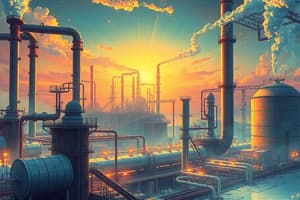Podcast
Questions and Answers
Match the following common chemicals with their industrial production processes:
Match the following common chemicals with their industrial production processes:
NH₃ = Haber process H₂SO₄ = Contact process Na₂CO₃ = Solvay process HNO₃ = Ostwald process
Match the following agricultural products with their uses:
Match the following agricultural products with their uses:
DAP = Nitrogen fertilizer Insecticides = Pest control Herbicides = Weed management Ammonium phosphate = Soil enrichment
Match the following industrial materials with their primary production processes:
Match the following industrial materials with their primary production processes:
Glass = Melting silica Cement = Clinker production Soap = Saponification process Pulp = Mechanical grinding of wood
Match the following natural resources with their classification:
Match the following natural resources with their classification:
Match the following steps with the industry they belong to:
Match the following steps with the industry they belong to:
Match the key aspects of industrial chemistry with their descriptions:
Match the key aspects of industrial chemistry with their descriptions:
Match the characteristics of chemical industries with their correct descriptions:
Match the characteristics of chemical industries with their correct descriptions:
Match the following products to their corresponding category in industrial chemistry:
Match the following products to their corresponding category in industrial chemistry:
Match the manufacturing aspects to their respective roles in society:
Match the manufacturing aspects to their respective roles in society:
Match the following terms with their definitions in industrial chemistry:
Match the following terms with their definitions in industrial chemistry:
Match the following aspects of industrial chemistry with their significance:
Match the following aspects of industrial chemistry with their significance:
Match the types of industries within manufacturing in Ethiopia with their examples:
Match the types of industries within manufacturing in Ethiopia with their examples:
Match the roles highlighted in the textbook with their corresponding descriptions:
Match the roles highlighted in the textbook with their corresponding descriptions:
Match the following natural resources to their importance in industrial chemistry:
Match the following natural resources to their importance in industrial chemistry:
Match the following chemical products to their types:
Match the following chemical products to their types:
Match the significance of quality control with its corresponding aspect:
Match the significance of quality control with its corresponding aspect:
Match the term to the specific concept it describes within industrial chemistry:
Match the term to the specific concept it describes within industrial chemistry:
Match the significant components in industrial chemistry to their roles:
Match the significant components in industrial chemistry to their roles:
Match the various manufacturing industries with their specific outputs:
Match the various manufacturing industries with their specific outputs:
Flashcards
What is industrial chemistry?
What is industrial chemistry?
Industrial chemistry focuses on applying chemical principles to transform raw materials into valuable products at a large scale, serving as a bridge between theoretical chemistry and its practical applications.
What are the main characteristics of chemical industries?
What are the main characteristics of chemical industries?
Chemical industries utilize raw materials, involve chemical reactions, consume energy, prioritize safety, and implement quality control to create products.
What is the role of industrial chemistry in society?
What is the role of industrial chemistry in society?
Industrial chemistry plays a critical role in modern society by producing a wide variety of essential products, such as plastics, fertilizers, and medicines, aiding in technological progress and fulfilling human needs.
Renewable Resources
Renewable Resources
Signup and view all the flashcards
Non-Renewable Resources
Non-Renewable Resources
Signup and view all the flashcards
Industrial Chemistry
Industrial Chemistry
Signup and view all the flashcards
Ammonia (NH₃)
Ammonia (NH₃)
Signup and view all the flashcards
Paper and Pulp Production
Paper and Pulp Production
Signup and view all the flashcards
Study Notes
3.1 Introduction - Industrial Chemistry
- Industrial chemistry applies chemical principles to create products on a large scale.
- Industrial chemistry forms the basis of many chemical industries that produce a diverse range of products.
- Key characteristics of chemical industries include:
- Use of various raw materials.
- Complex chemical reactions.
- High energy consumption.
- Strict safety measures.
- Robust quality control.
- Industrial chemistry is vital for societal needs, producing materials like synthetic fibers, plastics, and fertilizers.
3.2 Natural Resources and Industry
- This section examines the relationship between natural resources and industrial processes.
- Natural resources function as raw materials in industrial production.
3.2.1 Natural Resources (Raw Materials)
- Natural resources are the raw materials used to create many products.
3.2.2 Industry
- Industries convert raw materials into valuable products.
- Industrial processes rely heavily on raw material availability.
Studying That Suits You
Use AI to generate personalized quizzes and flashcards to suit your learning preferences.




